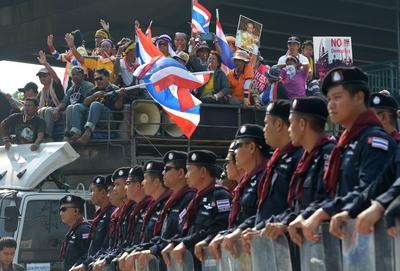The opposition movement, led by former Deputy Prime Minister Suthep Thaugsuban, has made it clear that the campaign to remove the government of Yingluck Shinawatra is far from over. The clashes on the streets of Bangkok will probably resume in the coming days. Having played a key role in the deadly suppression of the red-shirt protesters in 2010, Suthep is all too aware of the risk of turning Bangkok’s streets into a war zone. All the indications are that he will push on regardless.
Suthep’s agenda is now clear. He wants an appointed government to run Thailand, with a hand-picked ‘people’s council’ and a royally appointed prime minister. And he wants this authoritarian cabal to rid Thailand of the influence of Thaksin Shinawatra, who was prime minister from 2001 until he was deposed by a military coup in 2006. Suthep and his followers despise Thaksin and condemn the influence he has upon the government of his sister, Yingluck.
Suthep and his allies in the opposition Democrat Party don’t want Yingluck to resign and call an election because they know they will lose. Their electoral form has been reliably bad. The Democrats lost to Thaksin in 2001 and were decimated by him in 2005. They boycotted the snap election Thaksin called in 2006 (because they had no chance of victory) and were defeated again by Thaksin’s allies in the post-coup election of 2007. In 2011 Yingluck Shinawatra romped into power outpolling the Democrats by more than four million votes.
Stung by repeated electoral defeat, Thailand’s opposition is now walking away from the electoral process.
Suthep and his allies try to justify this extraordinary position by vilifying Thailand’s voters, especially the rural voters who provide Thaksin and his allies with their electoral dominance. They claim that Yingluck’s government is illegitimate because it was elected by poor and uneducated voters who sell their votes to the highest bidder.
As in most other countries, Thailand’s electoral process has its problems. But there is no credible commentator who would argue that the victories of Thaksin and his allies between 2001 and 2011 do not reflect the genuine will of the people.
These victories have been built on Thailand’s strong economic performance, rapid improvements in standards of living, declining poverty, universal health care and generous government subsidies for rural communities. The opposition Democrat Party has recognised the popularity of many of Thaksin’s policies and rushed to imitate them.
Thailand’s opposition forces are unwilling, and perhaps unable, to play a long game against Thaksin. A decade of electoral defeat is disappointing but it is hardly unprecedented in modern democratic systems. Thaksin has his weaknesses. He is vulnerable on the charge that he puts his own interests ahead of the national interest. His arrogance annoys many voters, even those who support him. Yingluck’s government has been wounded by recent political misjudgements and problems in the administration of her expensive rice subsidy program. For those interested in a long-term process of parliamentary and electoral struggle there is plenty of material to work with.
Unfortunately for Thailand, a rush to confrontation on the streets of Bangkok is now more attractive for opposition forces than a long-term process of electoral rebuilding. Attacking the electoral process has become more tempting than constructively participating in it. And an appointed government is being seriously proposed as an alternative to an elected one.
Of course, Suthep’s non-democratic option is no option at all.
The Bangkok-based journalists and academics who are inclined to give it credence are deluding themselves. Does anyone seriously think that the vast support base that Thaksin and Yingluck have cultivated will peacefully accept the overthrow of another elected government? Does an appointed body have any chance of displacing the influence of Thailand’s most successful electoral machine ever? Will a rural society that is now more socially and economically engaged than ever accept political marginalisation?
Suthep’s proposal is a recipe for civil conflict.
If Yingluck’s government is pushed aside, the pro-Thaksin red shirts will mobilise in massive numbers, both in Bangkok and the provinces. They have voted patiently and peacefully five times in favour of Thaksin and his allies. Their patience will be exhausted. There will inevitably be clashes with security forces and with Suthep’s mobs. Extremists on both sides of the political divide will be empowered to pursue their violent agendas. The chaos of 2010 when Bangkok’s beloved Central World Plaza was burnt down in the wake of the dispersal of the red shirts will look like a rather restrained dress-rehearsal.
The ceasefire that has been called in the skirmishes between protesters and police to mark the king’s birthday is certainly welcome. It shows that there is some truth to the much-stated claim that the monarchy is a unifying force in Thailand. The pause provides Suthep and his backers with an opportunity to reflect on the extraordinarily dangerous path that they have embarked on.
An unambiguous birthday statement from the palace that electoral democracy is Thailand’s only alternative might be enough to persuade Suthep to back off.
That would be a very welcome royal intervention.
Professor Andrew Walker is Deputy Dean at the ANU College of Asia and the Pacific. He is also co-editor of New Mandala.
This article was originally published here on the ANU College of Asia and the Pacific website.

